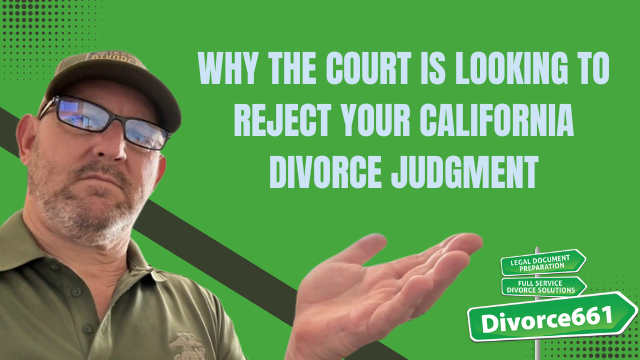Why the Court Is Looking to Reject Your California Divorce Judgment
Navigating the California divorce process can be overwhelming, especially if you’re representing yourself. Tim Blankenship of Divorce661 sheds light on a critical issue many people face: why courts are quick to reject divorce judgments. Understanding this can save you time, frustration, and potentially costly mistakes.
The Reality of Courtwork: High Volume and Pressure
The court system handling divorce judgments is incredibly busy. When a judgment takes up to three months for review, it’s important to realize the sheer volume of cases that court staff must process. These dedicated individuals spend their days reviewing countless divorce judgments, aiming to get through them as efficiently as possible. With heavy caseloads and likely quotas to meet, the review process becomes a race against time.
This high-pressure environment means that court reviewers are constantly looking for any reason to reject a submitted judgment. The goal is to ensure that only properly completed and legally sound documents make it through, but it also means that minor errors or omissions can lead to rejection.
Why Self-Represented Litigants Are at a Disadvantage
When you represent yourself in a divorce case, the court is aware that you may not be familiar with all the legal requirements and nuances involved. As Tim points out, “they already know you don’t know what you’re doing.” This assumption is often accurate, especially since most people filing for divorce are doing so for the first time.
Without an attorney or an experienced professional submitting the documents on your behalf, the court is more likely to scrutinize your paperwork closely and find mistakes. This can lead to a frustrating cycle of rejections, delays, and additional paperwork.
The Importance of Professional Assistance
Having someone like Tim or another legal professional submit your divorce judgment under a proper cover letter can make a significant difference. Professionals understand the court’s expectations and can ensure that the paperwork meets all requirements before submission. This decreases the chances of rejection and speeds up the overall process.
Common Reasons Divorce Judgments Get Rejected
While the court looks for any reason to reject, some common issues include:
- Incomplete or incorrect forms
- Missing signatures or notarizations
- Errors in legal descriptions or terms
- Failure to comply with court formatting rules
- Lack of proper supporting documents
These mistakes are often unintentional but can cause significant delays in finalizing your divorce.
Tips to Avoid Judgment Rejection
- Understand the Requirements: Familiarize yourself with the court’s specific rules and forms.
- Double-Check Your Paperwork: Review all documents carefully for completeness and accuracy.
- Seek Professional Help: Consider consulting with a legal expert or using services like Divorce661 to guide you through the process.
- Submit Under Proper Cover: A well-prepared cover letter and organized submission can positively influence the court’s review.
- Be Patient but Proactive: Understand that the process takes time but follow up promptly on any requests or notices.
Conclusion
Divorce is already a challenging life event, and the added stress of court rejections can make it even harder. The court’s busy docket and high standards mean that self-represented individuals face an uphill battle when submitting divorce judgments. By recognizing why courts reject judgments and taking proactive steps—such as seeking professional assistance—you can increase your chances of a smooth and timely divorce finalization.
Remember, the court staff are doing their job under pressure, and a carefully prepared submission is your best defense. Don’t let a simple mistake delay your divorce any longer than necessary.
For more insights and help with your California divorce, consider reaching out to experienced professionals who know the system inside and out.

